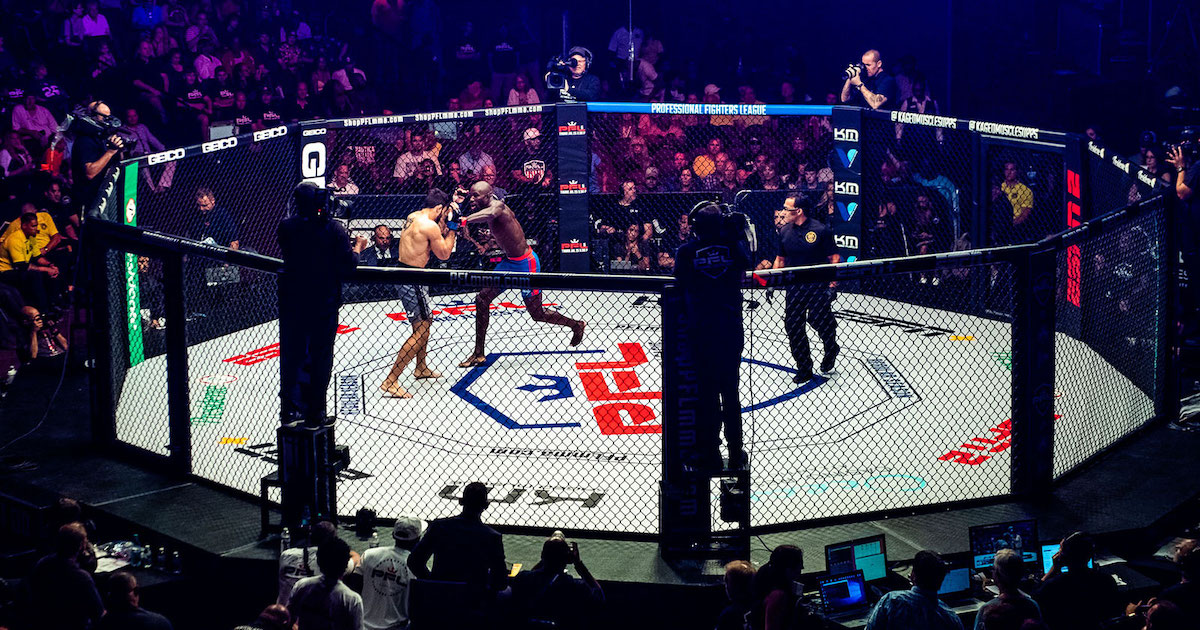PFL Founder Donn Davis on the Future of Made-for-TV Sports, Remote Work, and More
Donn Davis: PFL Is the Future of Sports as a "Made-for-TV" League

By
![]() Team Hashtag
•
3 min read
Team Hashtag
•
3 min read
September 22, 2020
In his role as Founder & Chairman, Donn Davis has helped PFL to become the fastest growing league in sports and has secured the valuable market position as the #2 MMA company worldwide. Donn is the visionary of the sport-season format and SmartCage platform, and he played a pivotal role in the launch of PFL Studios.
In a chat with Hashtag Sports, Donn shares his vision for the future of “made-for-TV” sports leagues, how PFL is scaling its content creation, and why he believes remote work isn’t here to stay.
PFL recently announced the launch of PFL Studios, a fully integrated global media division producing original MMA content for ESPN platforms. CEO, Peter Murray, said in an interview that the league is not just an event company but a media company and a content company. Can you discuss how this is a natural evolution for the league?
PFL is global sports media and content company, so our goal is to reach more consumers, more often, with deeper engagement. We created and produced 50 hours of live MMA fights in our first year (2018) and project we will grow to 450 hours of MMA content in 2025, both live fights and programming from PFL Studios. PFL is all about the video product – broadcast, streaming, mobile – and our focus is making the product the best for the 5 million fans watching more than the 5,000 fans attending.
As we enter the third decade of the 21st century, are all sports organizations also media and content companies, and if they are not, should they operate as such?
Sports that will create the most value over the next decade will tap into four key viewing changes and sports media trends: (1) growing sport, (2) youngest demo, (3) global audience, and (4) short and high-action contests. MMA is a bullseye on all four and thus will receive a significantly greater amount of rights fees and worldwide distribution.
While you don’t rely on a pay-per-view model, professional fighting does uniquely rely upon its fighters to promote events. What does the relationship look like between you and your fighters, and how do they leverage digital media to promote fights?
PFL is the first and only in MMA to have the sport-season format where individual fighters compete in the regular season, playoffs, and championship. We want MMA fans to be able to experience the innovative and exciting PFL product at no cost to consumers. 75 percent of UFC fights cost consumers money (either PPV or monthly ESPN+ streaming) and the PFL audience increased 50 percent in 2019 versus UFC declining 2 percent because MMA fans found the PFL fights on free broadcast or streaming to be a great alternative.
Has the PFL’s long-term growth strategy changed or simply been delayed as a result of the pandemic?
PFL is the #2 MMA company worldwide based on worldwide audience, global distribution, digital followers, and quality of fighter roster. We secured that market position in just 2 years passing Bellator. The pandemic just delayed our growth one year as our next season is locked and will start May 2021.
What do you believe is the single biggest challenge and biggest opportunity of putting on live sports and entertainment experiences in 2020? How does the industry shift and evolve its approach for building authentic relationships with fans and especially one that satisfies their biggest sponsors?
PFL is a “made for TV” product with only 5 percent of our revenue coming in any one year from tickets and fan experience revenues. So, the impact of “no fans” on PFL is immaterial from both quality of product and impact on business model. This compares favorably to the “Big 4” sports leagues which average 33% of annual revenue from tickets and fan experience revenues.
As an investor, what types of cutting-edge technologies do you believe will become most important to sports organizations now that “engagement” is the new “experience” as live attendance at events will be extremely limited in the months to come?
Fans want access—such as interviews pre-fight from the locker room. Fans want customization—like choosing their own camera viewing angles. Fans want personalization—like choosing their own announcer language. Fans want gaming and gambling—such as what will be the hardest punch in this round real-time prop bets. PFL is the innovation leader and will deliver MMA viewers all of these in PFL 2021 Season.
The sports betting market was set to boom in 2020. In the MMA space, record amounts have been wagered on UFC during the pandemic. What do you think the effects of the sports hiatus will mean for the near-term and long-term future of sports betting’s relationship with the industry and with fans?
Sport betting will be bigger than even the current hype. Once regular people can make legal and fun wagers on their mobile phones, this is a $100 billion market.
The NFL was among the first in sports to reopen their office when NYC lifted restrictions in June. Where do you stand on remote work, and what are your thoughts on the future impact on workplace environment and culture in the sports and entertainment world?
Remote work is convenient for the employees, but I believe is less effective for the company. Teamwork, culture, accountability, and speed of execution can only exist for so long remotely. So, the sooner we can safely get back into the office in 2021 the better.
Learn more about how to effectively engage the modern fan & consumer at Hashtag Sports, an annual conference designed for media and marketing professionals.